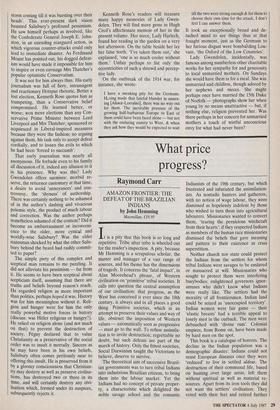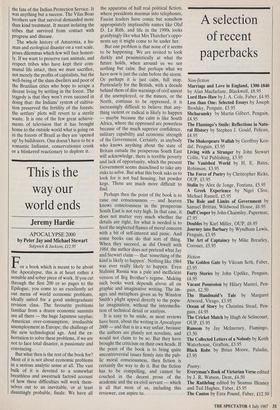What price progress?
Raymond Carr
AMAZON FRONTIER: THE DEFEAT OF THE BRAZILIAN INDIANS by John Hemming
Macmillan, £19.95
t is a pity that this book is so long and repetitive. Tribe after tribe is wheeled out for the reader's inspection. A pity, because Mr Hemming is a scrupulous scholar, the master and manager of a vast range of sources, and his theme has the dimensions of tragedy. It concerns the 'fatal impact', in Alan Moorehead's phrase, of Western civilisation on 'primitive' tribal societies. It calls into question the central assumption of our civilisation: that progress, as the West has conceived it ever since the 18th century, is always and in all places a good thing. Primitive societies, which in an attempt to preserve their values and way of life, obstruct the imposition of Western values — axiomatically seen as progressive — must go to the wall. To refuse assimila- tion is to invite destruction; regrettable no doubt, but such defeats are part of the march of history. Only the fittest societies, Social Darwinism taught the Victorians to believe, deserve to survive.
The theoretical aim of successive Brazil- ian governments was to turn tribal Indians into industrious Brazilian citizens, to bring them into the labour market. Yet the Indians had no concept of private proper- ty, a characteristic which delighted the noble savage school and the romantic
I
Indianists of the 19th century, but which frustrated and infuriated the assimilation- ists. As nomadic hunters and gatherers, with no notion of wage labour, they were dismissed as hopelessly indolent by those who wished to turn them into agricultural labourers. Missionaries wanted to convert them, 'tearing the pernicious witchcraft from their hearts': if they respected Indians as members of the human race missionaries dismissed the beliefs that gave meaning and pattern to their existence as crass superstition.
Neither church nor state could protect the Indians from the settlers for whom tribal Indians were savages to be enslaved or massacred at will. Missionaries who sought to protect them were interfering busybodies; enlightened governors ignor- amuses who didn't know what Indians were really like. The settlers had the morality of all frontiersmen. Indian land could be seized as 'unoccupied territory'. Indian women were fair game — their `elastic breasts' had a terrible appeal to lonely men in the outback. The men were debauched with 'divine rum'. Colonial empires, from Rome on, have been made by hard men on the spot.
This book is a catalogue of horrors. The decline in the Indian population was a demographic disaster: Indians could not resist European diseases once they were `reduced' to live in settled aldeas. The destruction of their communal life, based on hunting over large areas, left them without spiritual as well as material re- sources. Apart from its iron tools they did not want the settlers' civilisation. They voted with their feet and retired further
and further into the forest. The Chavante survived as a tribal unit till the 1950s by fighting and moving on.
The rubber boom, on which Mr Hem- ming has an excellent chapter, did less damage to the Indians than one might expect. Mackintosh invented the mackin- tosh in 1823: Goodyear accidentally disco- vered how to harden rubber for tyres in 1839. The boom of black gold was on. It built Manaus opera house which has be- come a symbol for the fate of developing countries. They get on to a good thing; then the market collapses. The Amazon rubber boom broke in 1923. Like gold rushes, it has left ghost towns behind. Nicolas Suarez, the greatest of the rubber barons, ruled five million hectares as a despot; he exterminated tribes who con- tested his sovereign power. Beside the Madeira river in Bolivia he built a hotel to which, the story goes, champagne and cigars were flown in from Paris for disting- uished guests; there was a theatre for his employees. Not a weed was allowed to grow in the streets. Now the jungle is swallowing it all up. I found his grandson living on in straitened circumstances, plagued by insects and dreaming of getting out to the beaches of Punta del Este. Amid the wreckage of steam engines and empty store houses his grandfather's rusting Mer- cedes surmounts his tomb.
Of course there are goodies as well as baddies in this depressing tale. Missionar- ies were well intentioned, but Protestants in particular, in my view, have done more harm than good. Nothing depressed me more than a mission station of dispirited Karaja Indians huddled in their bachelor hut, exposed to the scrutiny of visiting well-wishers. Whereas missionaries must seek to root out superstition, without such beliefs anthropologists would be out of a job. What the settlers scorned as the 'monotonous ditties' and 'endless chatter' are material for doctoral dissertations. The great German anthropologist Karl von den Steinen, whose wonder at finding unvisited tribes in the 1880s is well conveyed, re- spected Indians' customs even if he had a hard job defending their nakedness to a Victorian public. On the other hand, Varn- hagen, the Macaulay of Brazil, is a disgrace to my trade: 'There is no right of con- quest', he wrote, 'more just than that of civilisation over barbarism'.
Mr Hemming's hero is Candido Ron- don, one of the greatest modern explorers and creator of the Indian Protection Ser- vice in 1910. Rondon resisted forced Christianisation and saw that without their land Indians must perish. It is a sign that the settlers' view of Indians as mere savages was losing ground in Brazil that Rondon became a national hero, wel- comed on his return to Rio from the jungle by boatloads of congressmen and school- girls in national colours throwing petals. It is a pity that, excellent as it is, this book ends with Rondon and does not tell us of the fate of the Indian Protection Service. It was anything but a success. The Vilas Boas brothers saw that survival demanded more than kind treatment. It meant isolating the tribes that survived from contact with progress and disease.
The whole history of Amazonia, a hu- man and ecological disaster on a vast scale, poses dilemmas which few will face honest- ly. If we want to preserve rare animals, and respect tribes who have kept their com- munal life intact, then we must sacrifice, not merely the profits of capitalists, but the well-being of the slum dwellers and poor of the Brazilian cities who hope to scrape a decent living by settling in the forest. The tragedy is that they won't even succeed in doing that: the Indians' system of cultiva- tion preserved the fertility of the forests: the settlers' plots will revert to a sterile waste. It is one of the few great achieve- ments of television that it has brought home to the outside world what is going on in the forests of Brazil as they are 'opened up' by bulldozers. One doesn't have to be a romantic Indianist, conservationist crank or a blinkered reactionary to deplore it.




















































 Previous page
Previous page